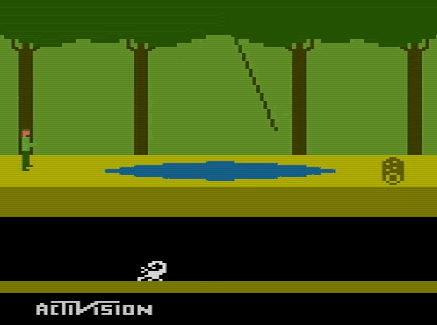The echoes of the 8-bit era resound with memories of perilous quests and charmingly pixelated landscapes. Among these treasured echoes, the footsteps of a brave adventurer named Pitfall Harry remain distinctly audible. Immortalized in Activision’s 1982 Atari 2600 masterpiece, 'Pitfall!', Harry's dangerous expedition through a digital jungle remains a cornerstone of the platforming genre.
Pitfall! emerged during a time when the gaming industry was expanding its horizons, daring to step beyond the boundaries of simplistic Space Invaders-style arcade shooters. Drawing on an environment typically associated with grand adventure narratives, it thrust players into a pixelated rainforest, rife with treasures, treacherous obstacles, and hidden dangers. The titular pitfalls, alongside a menagerie of threats like venomous scorpions, menacing crocodiles, and deadly tar pits, presented a challenge reminiscent of the future Indiana Jones titles on the Commodore 64.
Unlike many games of the era, Pitfall! was not confined to a single screen. It instead unveiled a sprawling world of 255 screens that invited exploration. This expansive non-linear playground allowed the player to navigate left or right, a design decision that introduced a fresh sense of freedom. This open approach was a trailblazer for future exploration-centered games such as Metroid on the NES, providing a stark contrast to the fixed levels of earlier titles like 'Donkey Kong'.
Pitfall! also introduced an element of strategy and planning to the platformer genre. With a stringent 20-minute time limit to collect all 32 treasures, players were challenged to map out their route meticulously and optimize their movements to avoid wasted time. This requirement for foresight and decision-making marked a departure from the frantic, reactionary gameplay seen in games like 'Space Panic' or 'Frogger'.
Graphically, Pitfall! showcased a distinct aesthetic that was charming and evocative. The undulating greenery of the jungle and the memorable animations of Pitfall Harry himself created a rich visual landscape that entranced players, putting games like 'Jungle Hunt' on the Atari 800 or 'Sabre Wulf' on the ZX Spectrum in a similar category.
Beyond the visuals, the subtle auditory cues of Pitfall! added to the immersive jungle atmosphere. The sonic signature of Pitfall Harry's footfalls, the chime of collected treasure, or the heart-stopping hiss of lurking serpents, though simple, enriched the experience, much like the later Commodore 64 game, 'Bruce Lee'.
Interestingly, Pitfall! featured no enemies to be defeated – a departure from most games of the time. The goal was purely survival and treasure hunting, a focus that was both refreshing and distinctive. This approach contrasts with games like 'Lode Runner' or 'Boulder Dash', where enemies were integral to the gameplay mechanics.
Additionally, Pitfall!'s use of hidden elements, such as the underground tunnels, brought a sense of mystery and discovery to the game, creating a world that felt layered and deep. This sense of concealed depth was a precursor to later games such as 'The Legend of Zelda' on the NES, where secret areas held the key to progression.
In the grand scheme of the 8-bit era, 'Pitfall!' stands tall as a pioneering influence. It offered a fresh perspective on the capabilities of home consoles and set the stage for countless adventure platformers that followed. Its influence is seen in everything from 'Super Mario Bros.' expansive world design to 'Prince of Persia's intricate environmental puzzles.
Looking back, it’s impossible not to admire the significance of Pitfall! in the context of its era and beyond. Despite its simple premise, it managed to captivate players with its blend of exploration, timing, and strategic planning, wrapping it all in an adventurous package that still holds a unique charm today.
As the curtains draw on this retrospective journey, it's clear that 'Pitfall!' is not just an important landmark in the evolution of gaming. It's a testament to the enduring appeal of the 8-bit era, a time when a few kilobytes of data, an imaginative concept, and simple yet engaging gameplay mechanics could captivate the hearts and minds of gamers around the globe. 'Pitfall!' may have aged in terms of graphics and sound, but the pioneering spirit it embodies is ageless, and its echo in the annals of gaming history remains as vivid as ever.




























No comments:
Post a Comment